What are coordinating adjectives? What is a coordinate adjectives? Are they the same? Coordinate adjectives are words that describe the same attribute of the same noun or subject. Coordinate adjectives are typically separated by a comma or by the word “and.” They always come before the final adjective.
In this guide, we’ll cover what coordinate adjectives are, how two coordinate adjectives are used in a sentence, and how they modify the same noun. Ready to learn? Let’s go!
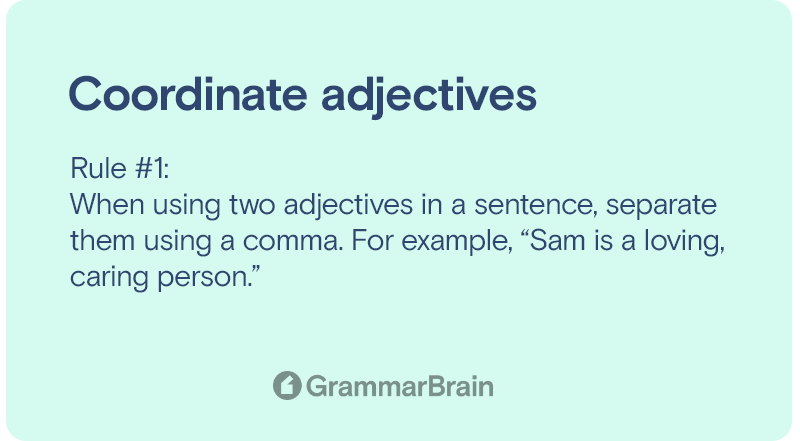
What Are Coordinating Adjectives?
Coordinating adjectives are two or more adjectives in a sentence working together to describe the same noun, pronoun, or subject.
| Form | Definition |
| Coordinate adjectives | Coordinate adjectives are words that describe some attribute of the same noun or subject |
Let’s understand how they are used in a sentence.
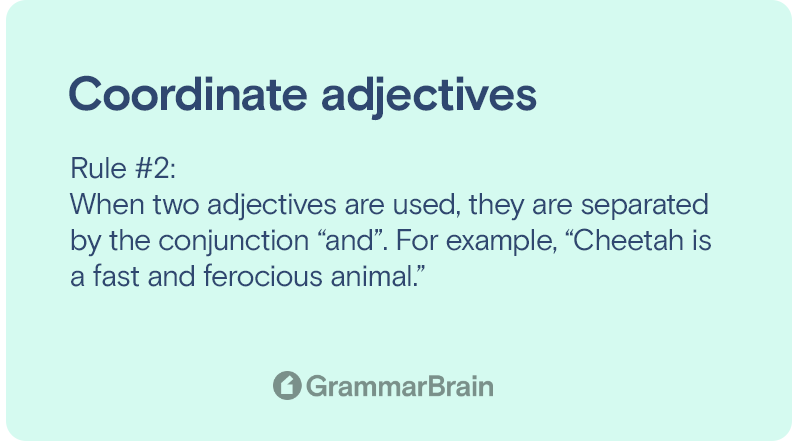
How to Make Coordinate Adjectives
If you’re familiar with constructing sentences with adjectives, then constructing sentences with coordinating adjectives becomes easier. Let’s look at an example of a sentence with an adjective that will help us understand the construction of sentences with coordinating adjectives.
Adjective Example:
John is smart. This simple sentence is constructed using a descriptive adjective. Here, “smart” is the adjective describing the noun “John.” The adjective gives more information about the person.
If you want to describe more about the person in the above example, multiple adjectives are used. These adjectives are called coordinating adjectives.
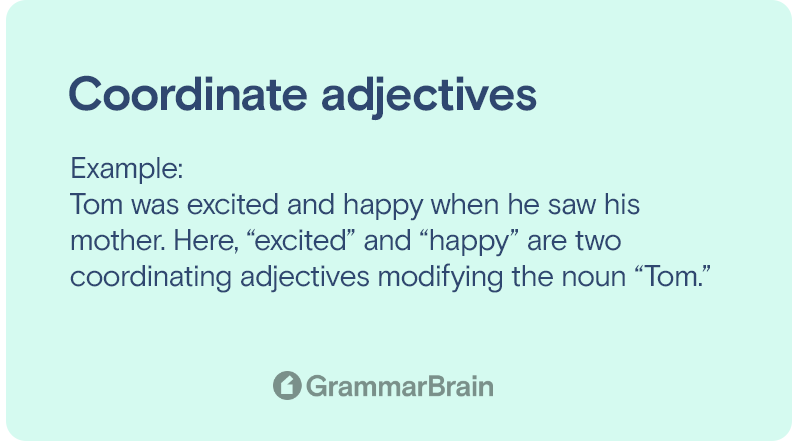
Coordinating Adjectives Example:
John is smart and handsome. Here, the adjectives “smart” and “handsome” describe the same noun independently. To put it in simple words, John is smart, and John is handsome.
Grammar Rules For Coordinating Adjectives
Here are a couple of grammar rules you should know when using them in a sentence.
- When using two adjectives in a sentence, separate them using a comma. For example, “Sam is a loving, caring person.”
- Alternatively, when two adjectives are used, they are separated by the conjunction “and”. For example, “Cheetah is a fast and ferocious animal.” Here, the conjunction “and” is used to separate the two adjectives “fast” and “ferocious.”
Examples
- Tom was excited and happy when he saw his mother. Here, “excited” and “happy” are two coordinating adjectives modifying the noun “Tom.”
- The statue is wide and tall in size. Here, “wide” and “tall” are two coordinating adjectives modifying the noun “statue.”
- Amelie’s daughter is clever, attractive, and helpful. Here, “clever,” “attractive,” and “helpful” are three coordinating adjectives describing the noun “daughter.”
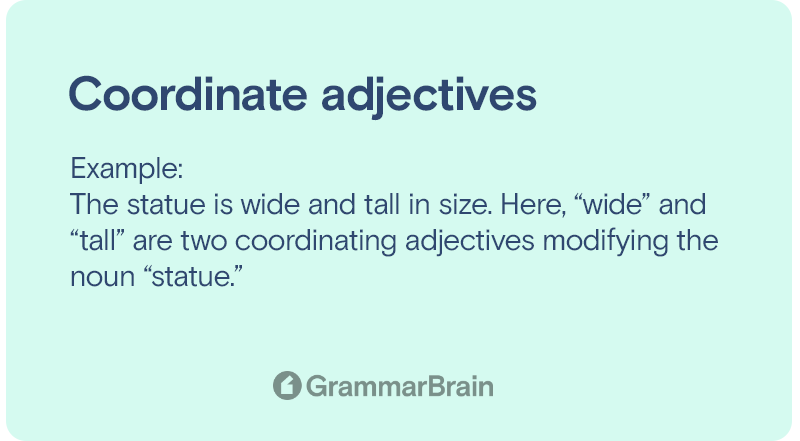
How to Punctuate Coordinating Adjectives
Here’s how to punctuate coordinating adjectives:
Punctuating Short Coordinate Adjectives
A comma is used between them to punctuate short coordinate adjectives, which means two adjectives in a sentence.
Examples:
- Paris is a beautiful, modern city. The adjectives “beautiful” and “modern” are separated using the comma.
- She wears stylish, modern clothes.
Punctuating Long Coordinate Adjectives
Long coordinate adjectives are more than two adjectives in a sentence. To punctuate them, a comma is used to separate the first two adjectives, and the conjunction “and” is used for the last adjective. It is also possible to use a comma to separate the first two adjectives and an oxford comma and the conjunction “and” for the last adjective. The second example uses the oxford comma.
Examples:
- Amelie is a young, smart, and beautiful person.
- The T-shirt is blue, striped, and sleeveless.
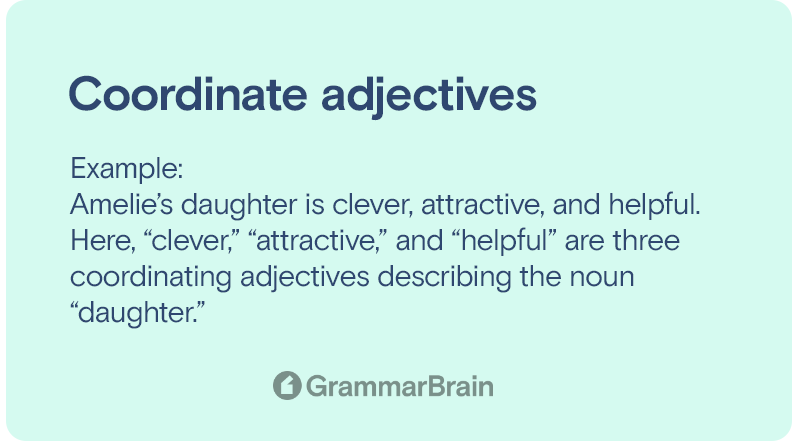
| Rule | Example |
| Use a comma between coordinate adjectives not joined by “AND” | She was a friendly, warm, kind woman. She was a kind, warm, friendly woman. |
Coordinate Adjectives vs. Compound Nouns
A compound noun combines two or more words to form a single noun. For example, “firefighter,” “bread box,” or “six-pack” are all compound nouns. Here, “fire” and “fighter” are combined to form a single noun – firefighter. On the other hand, coordinating adjectives are two or more adjectives describing a noun in a sentence.
“There is a small blue box.” This sentence is a coordinating adjective sentence. The adjectives “small” and “blue” modify the noun “box.” On the other hand, here is an example of a compound noun sentence, “There is a small chocolate box.” Here the adjective “small” is modifying a compound noun “chocolate box.”
Coordinate Adjectives vs. Cumulative Adjectives
Coordinate adjectives are two or more adjectives that describe a noun where the adjectives can exchange positions. On the other hand, cumulative adjectives are also two or more adjectives that describe a noun, but the adjective’s positions can’t be exchanged.
A coordinate adjective(s) example is “She is smart and beautiful”. Even when the two adjectives exchange positions, the sentence conveys the same meaning. “She is beautiful and smart” is the same as the earlier sentence.
Cumulative adjectives example is “She gave me a small hibiscus plant.” In this example, the type of plant is a small hibiscus. Here, the sentence becomes invalid if the adjectives “small” and “hibiscus” exchange their positions. “She gave me a hibiscus small plant” makes no sense.
A comma or the conjunction “and” are used to separate coordinate adjectives, whereas these are not applicable for cumulative adjectives.
What Are Coordinated Descriptors?
Another name for coordinate adjectives is coordinated descriptors. Descriptors are nothing but words used to describe something in a sentence. When using multiple descriptors, they enhance the English language.
How to Check If Adjectives Are Coordinate or Not?
Performing two tests determines if the adjectives are coordinate or not. They are:
- By placing the conjunction “and” between the adjectives. After placing it, if the sentence makes sense, then the adjectives are coordinating adjectives.
- By exchanging the positions of the adjectives. After exchanging the positions, if the sentence conveys sensible meaning, they are coordinate adjectives.
FAQs
What are coordinate adjectives examples?
- Tom was excited and happy when he saw his mother. Here, “excited” and “happy” are two coordinating adjectives modifying the noun “Tom.”
- The statue is wide and tall in size. Here, “wide” and “tall” are two coordinating adjectives modifying the noun “statue.”
Can a cumulative adjective order get modified?
No. Each cumulative adjective increases the level of importance as it gets closer to the noun it’s modifying.
Inside this article
Fact checked:
Content is rigorously reviewed by a team of qualified and experienced fact checkers. Fact checkers review articles for factual accuracy, relevance, and timeliness. Learn more.
Core lessons
Glossary
- Abstract Noun
- Accusative Case
- Anecdote
- Antonym
- Active Sentence
- Adverb
- Adjective
- Allegory
- Alliteration
- Adjective Clause
- Adjective Phrase
- Ampersand
- Anastrophe
- Adverbial Clause
- Appositive Phrase
- Clause
- Compound Adjective
- Complex Sentence
- Compound Words
- Compound Predicate
- Common Noun
- Comparative Adjective
- Comparative and Superlative
- Compound Noun
- Compound Subject
- Compound Sentence
- Copular Verb
- Collective Noun
- Colloquialism
- Conciseness
- Consonance
- Conditional
- Concrete Noun
- Conjunction
- Conjugation
- Conditional Sentence
- Comma Splice
- Correlative Conjunction
- Coordinating Conjunction
- Coordinate Adjective
- Cumulative Adjective
- Dative Case
- Determiner
- Declarative Sentence
- Declarative Statement
- Direct Object Pronoun
- Direct Object
- Diction
- Diphthong
- Dangling Modifier
- Demonstrative Pronoun
- Demonstrative Adjective
- Direct Characterization
- Definite Article
- Doublespeak
- False Dilemma Fallacy
- Future Perfect Progressive
- Future Simple
- Future Perfect Continuous
- Future Perfect
- First Conditional
- Irregular Adjective
- Irregular Verb
- Imperative Sentence
- Indefinite Article
- Intransitive Verb
- Introductory Phrase
- Indefinite Pronoun
- Indirect Characterization
- Interrogative Sentence
- Intensive Pronoun
- Inanimate Object
- Indefinite Tense
- Infinitive Phrase
- Interjection
- Intensifier
- Infinitive
- Indicative Mood
- Participle
- Parallelism
- Prepositional Phrase
- Past Simple Tense
- Past Continuous Tense
- Past Perfect Tense
- Past Progressive Tense
- Present Simple Tense
- Present Perfect Tense
- Personal Pronoun
- Personification
- Persuasive Writing
- Parallel Structure
- Phrasal Verb
- Predicate Adjective
- Predicate Nominative
- Phonetic Language
- Plural Noun
- Punctuation
- Punctuation Marks
- Preposition
- Preposition of Place
- Parts of Speech
- Possessive Adjective
- Possessive Determiner
- Possessive Case
- Possessive Noun
- Proper Adjective
- Proper Noun
- Present Participle
- Prefix
- Predicate



